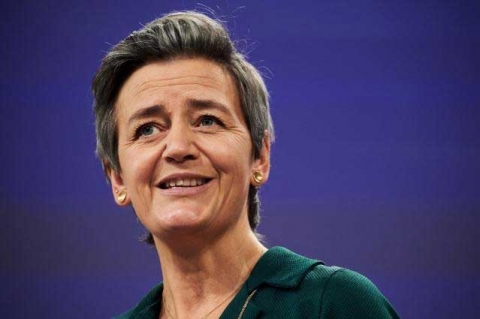The European Commission’s latest initiatives to regulate digital services and markets will ensure that providers take responsibility for the services they offer and that digital giants do not impose their own rules on Europe’s markets, said Commission executive vice-president Margrethe Vestager at the EESC’s December plenary.
The European Commission’s Digital Services Act and the Digital Markets Act, released on 15 December, will help European democracy catch up with the last twenty years of digital development, defining how digital services should be provided and digital markets work, said Ms Vestager to the EESC’s plenary during a debate on A Europe fit for the digital age.
EESC president Christa Schweng stressed that the digital transition has become more important than ever as one of the two building blocks of Europe’s recovery from the COVID-19 crisis, together with the green transition.
The EESC president quoted a recent study which estimated that by 2030 the cumulative additional GDP contribution of new digital technologies could amount to EUR 2.2 trillion in the EU – the equivalent of Spain’s and the Netherlands’s combined GDP for 2019.
Ms Schweng said: “We need a European, human-centred approach to digitalisation. Without the trust of the citizens and businesses we will not be able to seize the opportunities offered by digitalisation. To that end, it’s important to build a genuine European Dataspace where our data is protected and privacy and self-determination are ensured. We also need to build EU technological sovereignty while maintaining global digital trade.”
Ms Vestager outlined the key elements of the Commission’s digital strategy, its focus on leveraging private investment, its reliance on flagship initiatives (on digital skills, digital public services and cybersecurity) and the building and deploying of digital capacities.
Now “the Digital Services Act will make sure that digital service providers take responsibility and are accountable for the services they provide and that trust can be rebuilt,” said Ms Vestager. “Illegal online content and products which do not live up to the rules that we have for physical products are the problem. Both should be fixed, and should be fixed on a European scale.”
“The Digital Markets Act”, she went on to remark, “will say to giant companies: you are more than welcome to do business in Europe, you are more than welcome to be successful, but there is a list of do’s and don’ts when you reach that gatekeeper position in order for fair competition to be there and serve consumers in the best possible manner. The fundamental point here is that the market should serve us as consumers and that we want technology that we can truly trust.” (dm)


















